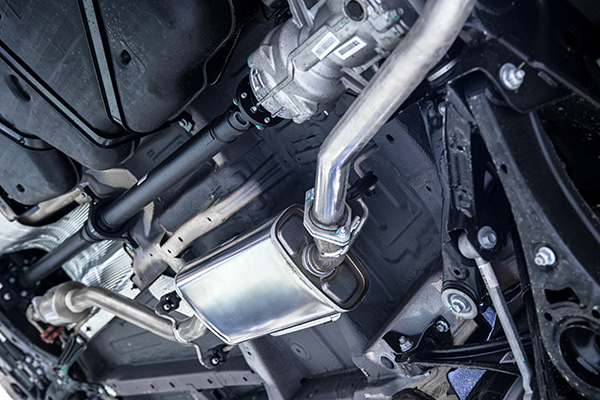
Your car’s exhaust system is important for performance, emissions control, and even fuel efficiency. It’s easy to forget about it until you hear a loud noise, smell fumes, or fail an emissions test. But routine inspections can help identify problems early and prevent costly repairs later.
If you're unsure what happens during an exhaust system inspection, here’s what technicians usually look for and why it matters for your vehicle’s safety and longevity.
Why the Exhaust System Is So Important
The exhaust system is responsible for directing harmful gases safely away from the engine and passenger cabin. It reduces emissions, keeps noise under control, and helps your engine breathe better. A properly functioning exhaust system contributes to smoother engine performance and better fuel economy.
Even small leaks or cracks in this system can lead to serious issues, such as decreased power, unusual odors, or the entry of harmful gases into the cabin.
What a Technician Checks During an Exhaust Inspection
An inspection typically starts with a visual check. The technician will look at the entire length of the exhaust system, from the exhaust manifold near the engine to the tailpipe at the back of the car. They’re looking for signs of:
- Rust or corrosion
- Cracks or holes
- Loose or missing clamps and hangers
- Leaking gaskets
- Burn marks or dark soot deposits near joints
Some of these issues are easy to see from underneath the vehicle, while others may require a lift for a better view.
Listening for Trouble
Sound plays a big role in identifying exhaust problems. A technician will often start the engine and listen closely to how it runs. A loud rumble, hissing, or tapping noise could point to a crack or leak. Sometimes, the problem is a damaged muffler or a hole in the resonator, both of which affect sound levels and overall performance.
A change in the sound of your vehicle, especially if it gets louder during acceleration, is often one of the first signs that something is wrong with the exhaust.
Checking the Exhaust Manifold and Gaskets
The exhaust manifold connects the engine to the rest of the exhaust system. It is usually made of cast iron or stainless steel and is designed to collect exhaust gases from each cylinder. If the manifold is cracked or if the gasket is failing, it can cause ticking noises, reduced engine performance, and exhaust leaks.
A technician will inspect the area around the manifold, look for soot or black streaks that indicate leaks, and verify that all bolts are tight and secure.
Inspecting the Catalytic Converter
The catalytic converter helps reduce harmful emissions by converting carbon monoxide and other pollutants into less harmful gases before they exit the tailpipe. If this component becomes clogged, damaged, or contaminated, your vehicle may struggle to accelerate, and the Check Engine light may come on.
During an inspection, technicians will check for heat damage, rattling sounds (which can indicate a broken internal part), and test for backpressure or restriction. A failing catalytic converter can also affect fuel economy and may cause your vehicle to fail an emissions test.
Evaluating the Oxygen Sensors
Modern vehicles use oxygen sensors to monitor the amount of oxygen in the exhaust and help the engine adjust the air-fuel mixture. If these sensors are faulty, the engine might run too rich or too lean. That means more fuel usage, rough idling, or increased emissions.
An inspection will usually involve a scan of the engine computer to check for fault codes related to the oxygen sensors. Technicians may also look at live data to see how the sensors are functioning in real-time.
Examining Mufflers and Tailpipes
The muffler reduces the noise produced by your engine’s exhaust gases. If it has rust holes or loose internal components, you may notice your vehicle sounds much louder than usual. Tailpipes can also rust, break loose, or develop cracks, especially in regions with moisture, road salt, or older vehicles.
While not always a performance issue, problems here can increase noise pollution and lead to failed inspections in some areas.
When to Get Your Exhaust System Inspected
It’s a good idea to have your exhaust system inspected at least once a year, especially if:
- You hear unusual noises while driving
- You notice a strong smell of exhaust fumes
- Your fuel economy has dropped suddenly
- You see rust under the vehicle
- The check engine light is on
Catching issues early can save you money and prevent larger problems like engine strain or emissions failures.
Get a Thorough Exhaust System Inspection at Advanced Auto Care Center Florida in Gainesville, FL
If your car is louder than usual, struggling to accelerate, or due for routine service, an exhaust system inspection may be the smart next step. At Advanced Auto Care Center Florida in Gainesville, FL, our technicians check every component of your vehicle’s exhaust system to make sure it’s working properly. From the manifold to the tailpipe, we’ll diagnose any leaks, damage, or failing parts and get your car back to smooth, quiet, and efficient driving.
Schedule your inspection today and keep your engine breathing clean.